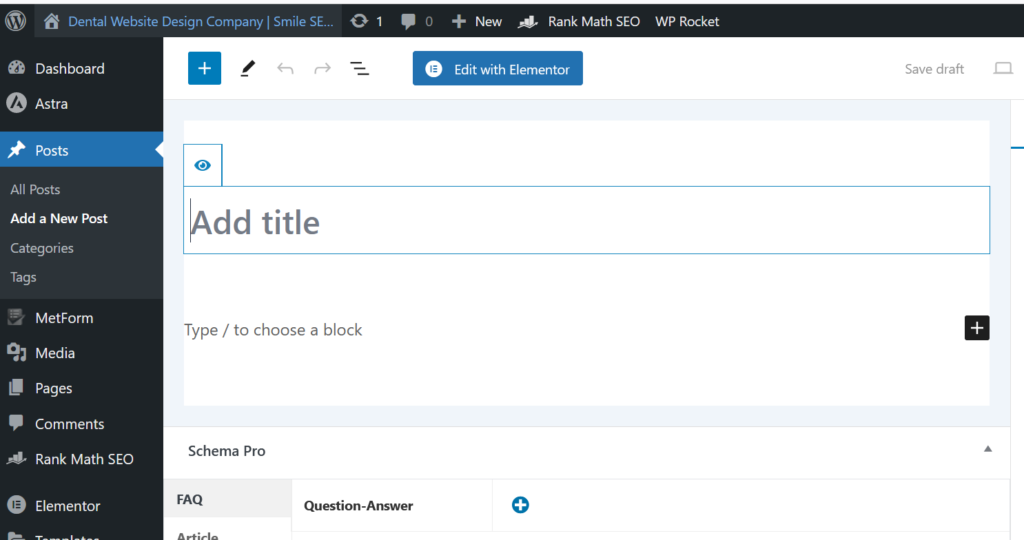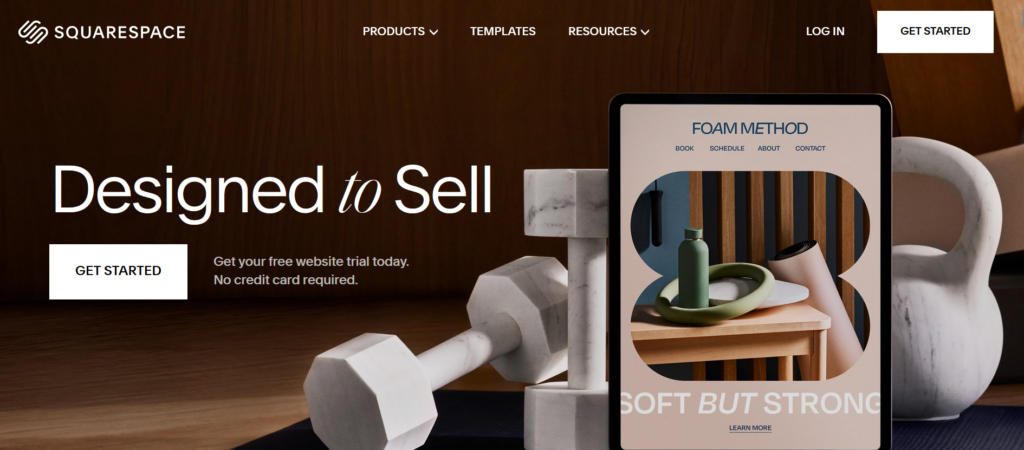Are you considering a hassle free management of your dental website? Have you ever wished your website could keep up with the latest trend without any tech headache? That’s where the benefits of using a CMS for a dentist’s website lies.
In this article, we will explore the 17 key benefits of using a CMS for a dentist’s website and why it is such a powerful tool. So, let’s deep dive!
What is a CMS?
CMS stands for content management system, which allows you to update, edit, manage and publish content on your website. It is crucial for effectively organizing your content, which enhances the overall functionality of a dentist’s website.
A CMS functions as a centralized control panel, enabling users to effortlessly update, modify, and expand their website’s elements without delving into complex coding.
17 Key Benefits of Using a CMS for a Dentist’s Website
1. Enhanced Accessibility and User-Friendly Interface
One of the key benefits of using a CMS for a dentist’s website is enhanced accessibility and user-friendly interface. A CMS provides a user-friendly interface that allows dentists to manage and update their website without any coding knowledge.
With a CMS, dentists can easily:
– add new content,
– update existing information, or
– make design changes with just a few clicks.
This level of accessibility ensures that dentists have full control over their website, making it easy to keep it up-to-date and relevant.

2. Improved Search Engine Optimization (SEO) is One of the benefits of using a CMS for a dentist’s website
Incorporating Local SEO is important for dentists for attracting organic search traffic. A CMS offers various SEO-friendly features that can help boost a dentist’s website rankings on search engine result pages.
You should use a CMS for your website because it optimizes:
- your website’s meta tags,
- headings, and
- URLs,
- ensuring that their content is easily discoverable by search engines.
- Additionally, CMS platforms often provide built-in SEO plugins or integrations that further simplify the process of optimizing the website’s content for search engines.

3. Seamless Website Design and Customization
A professionally designed and visually appealing website is essential for creating a positive first impression on potential patients.
CMS platforms provide numerous pre-designed templates and themes that dentists can choose from. These templates are customizable, allowing dentists to tailor their website’s design to reflect their unique brand and practice.
As a dentist, you should use a CMS because dentists can create a visually stunning website that resonates with their target audience. Seamless website design is one of the benefits of using a CMS for a dentist’s website. It also helps improve dental business.
4. Mobile Responsiveness is One of the Benefits of using a CMS for a dentist’s website
In today’s mobile-driven world, having a website that is optimized for mobile devices is crucial. Making a website mobile responsive also makes the website user-friendly.
CMS platforms offer responsive design options, ensuring that a dentist’s website looks great and functions seamlessly on any device, be it a desktop, tablet, or smartphone.
With a dental website CMS, dentists can deliver an enhanced user experience to potential patients, regardless of the device they are using to access the website.
5. Streamlined Appointment Management
One of the key benefits of using a dental website CMS for a dentist’s website is the ability to integrate appointment scheduling and management systems.
- A CMS can facilitate the seamless integration of online booking systems, allowing patients to schedule appointments directly through the website.
- This not only streamlines the appointment process for patients but also improves the overall efficiency of the dental practice.
- The CMS should be connected to the dentist’s schedule in real-time, ensuring that patients see up-to-date availability.
- The CMS can automate appointment reminders via email or SMS. Patients receive notifications before their scheduled appointments.
- Patients may have the option to create accounts within the CMS. This allows them to log in, view their past and upcoming appointments.
- If applicable, the CMS can handle secure payment processing for appointment fees or deposits.
6. Increased Security
One of the major benefits of using a CMS for a dentist’s website is increased security. CMS platforms are constantly updated to ensure optimal performance and security.
- The CMS should utilize SSL encryption to secure data transmitted between the website and users. This ensures that sensitive information, such as patient details and appointment data.
- The CMS should have robust user authentication mechanisms. This involves secure login processes and the use of strong passwords.
- If the website handles online forms or payment transactions, the CMS should integrate secure protocols.
7. Multi User Accessibility
A CMS often supports multiple user accounts, each with designated roles and permissions. This feature facilitates collaboration within the dental team.
Different staff members can contribute to content creation, updates, or maintenance without compromising the security or integrity of the website.
8. Scalability
As a dental practice expands its services or introduces new features, a CMS offers scalability. With this feature, dentists can:
- effortlessly add new pages to the website,
- Can deal with traffic analysis
- Increase content on the website
- Include advanced features, etc.
9. Regular Updates and Support
CMS providers regularly release updates that include security patches. This proactive approach helps in safeguarding the website against potential vulnerabilities and cyber threats.
Regular updates ensure that the CMS remains resilient to evolving security challenges, providing a secure environment for patient data and online interactions. CMS platforms typically offer customer support, providing dentists with assistance when facing technical issues or seeking guidance on optimizing their websites. This also helps keep dental practice up-to-date on latest trends.
10. Blog Integration
A CMS often includes built-in blogging features, allowing dentists to publish informative and educational content. Regularly updating a blog with articles about oral health, treatment options, tips for dentists, or industry news not only keeps patients informed but also positions the dental practice as an authority in the field.
11. Analytics Integration
Analytics tools integrated with a CMS enable dentists to track key performance indicators, such as:
- appointment requests,
- contact form submissions, or
- newsletter sign-ups
- Visitor demographics,
- Popular pages integration, etc.
This information is crucial to make informed decisions about content strategy, marketing efforts, and user experience improvements. This is one of the most promising benefits of using a CMS for a dentist website.
Hiring a professional dental website designer to build and maintain a dentist’s website can benefit you in many ways. Similarly, a CMS helps you manage extensive coding knowledge and expensive development services. Dentists can manage and update their website without any additional expenses, minimizing their overall website maintenance costs. So, cost effectiveness is one of the key benefits of using a CMS for a dentist’s website.
12. Social Media Integration is One of the Key Benefits of Using a CMS for a Dentist’s Website
CMS allows integrating social media buttons (such as Facebook, LinkedIn, Instagram, etc) on the website and encourages visitors to follow and share the dental practice’s social profiles.
- Social Media Integration aligns your website with your broader digital marketing strategy. Coordinated efforts across your website and social platforms create a unified brand message.
- Social Media Integration allows for real-time updates. Whether it’s sharing recent dental procedures, community involvement, or promotions, your website can dynamically display your latest social media posts.
- Integrating social media buttons on your website encourages visitors to follow and share your content. In this way, dentists can also use social media to market dental business.
- Social Media Integration allows for effortless cross-promotion. Your website becomes a gateway to your social profiles, and vice versa.
Read more: How Do I Promote a Dental Clinic on Instagram
13. Customization Options
Customization Options in CMS provides a number of advantages:
- Branding Consistency
CMS platforms offer customization options that allow dentists to align their website with their branding. This includes incorporating the practice’s logo, color scheme, and visual elements, ensuring consistency with other marketing materials.
- Tailored User Experience
Dentists can customize the layout and design of their website to create a user experience that aligns with their brand identity and caters to the preferences of their target audience.
- Adaptability to Trends
Customization options enable dentists to adapt their website to current design trends or seasonal promotions easily. Whether it’s updating banners, introducing special offers, or modifying the layout, customization allows for flexibility in responding to evolving marketing strategies.
14. Cost-Effectiveness is One of the Key Benefits of Using a CMS for a Dentist’s Website
Hiring a professional dental website designer to build and maintain a dentist’s website can benefit you in many ways. But a CMS can be a more cost effective option for you.
- Reduced Development Costs
CMS platforms significantly reduce ongoing development costs. Dentists can manage content updates independently, eliminating the need for continuous involvement of web developers.
- Lower Training Costs
CMS platforms are known for their user-friendly interfaces. Dentists and their staff can quickly learn how to use the CMS without the need for extensive training programs.
15. Time Efficiency
CMS platforms are designed with user-friendly interfaces that simplify the process of managing and updating website content. Dentists can navigate through the CMS dashboard with ease, making quick edits or additions without the need for extensive training.
16. Template Flexibility
- Diverse Design Options
Different kinds of template availability is one of the key benefits of using a CMS for a dentist’s website. CMS platforms typically offer a range of templates and themes with diverse designs. This flexibility allows for a customized and branded look without the need for extensive custom development.
- Easy Theme Switching
Dentists can easily switch between templates or themes without disrupting the overall structure of the website. This is particularly useful if there is a need for a seasonal change, a rebranding effort, or an update to match current design trends.
- Customization Within Templates
Even within a chosen template, CMS platforms often provide customization options. Colors, fonts, layouts, and other visual elements can be adjusted to tailor the template to their specific requirements.
17. Integration with Third-Party Tools
Integration with third- party tools is one of the key benefits of using a CMS for a dentist’s website.
- Enhanced Functionality
CMS platforms support seamless integration with various third-party tools and applications. Dentists can integrate appointment scheduling systems, payment gateways, or patient management tools directly into their website.
- Streamlined Workflows
Integration with third-party tools streamlines workflows within the dental practice. For example, patient information collected through online forms can be directly integrated into the practice’s management system, reducing manual data entry and minimizing the risk of errors.
6 Most Popular CMS Tools for a Dentist’s Website
I. WordPress
WordPress is a widely-used open-source content management system known for its flexibility and ease of use. Almost 40% of websites use WordPress as their CMS. It powers a significant portion of websites on the internet. WordPress has a vast repository of plugins that extend its functionality.
For dentists, there are plugins like Appointment Booking, which enables patients to schedule appointments online, and DentalPress, a plugin designed for dental clinics, allowing easy management of patient information, appointments, and services.
II. Wix
Wix is a user-friendly website builder that allows users to create websites using a drag-and-drop interface. It’s known for its simplicity and is a suitable option for those who may not have extensive technical skills. Almost 10% of websites are built on Wix.
Dentists can choose a template that aligns with their brand and customize it to include essential information, such as services offered, contact details, and appointment scheduling.
III. Squarespace
Squarespace is an all-in-one website building and hosting platform. It is known for its user-friendly interface, elegant templates, and integrated features, making it a popular choice for individuals and businesses, including dental practices, to create professional and visually appealing websites without requiring extensive technical expertise.
Squarespace offers a range of professionally designed templates that are visually appealing and mobile-responsive.

IV. Joomla
Joomla is another open-source CMS that provides flexibility and extensibility. It’s known for its user-friendly interface and robustness. Joomla uses extensions to add functionalities to a website. Dentists might use this tool for organizing workshops, seminars, or events related to oral health.
V. HubSpot CMS
HubSpot is a comprehensive platform that combines content management with marketing, sales, and customer service tools. It’s especially popular for businesses looking for an all-in-one solution. HubSpot CMS seamlessly integrates with the HubSpot CRM, allowing dentists to manage patient relationships efficiently.
VI. Shopify
Shopify is a robust e-commerce platform designed to simplify the process of creating and managing online stores. It is known for its user-friendly interface, extensive customization options, and a range of features that cater to businesses of all sizes, including dental practices looking to sell products or services online.
Dentists can easily add, categorize, and manage their products through Shopify’s intuitive dashboard.

How Can You Get Started with a CMS?
Getting started with a CMS includes several steps, such as:
Choose the Right CMS:
Research and choose a CMS that suits your needs. Popular options include WordPress, Joomla, Drupal, Wix, and Squarespace. Consider factors like ease of use, customization options, and scalability.
Domain and Hosting:
Choose and register a domain name for your website. Select a reliable hosting provider that supports the chosen CMS. Some CMS platforms offer their hosting services.
Install the CMS:
Follow the instructions provided by your hosting provider to install the chosen CMS. Many hosting providers offer one-click installations for popular CMS platforms.
Setup and Configuration:
Complete the initial setup and configuration of your CMS. This may include setting up basic site information, creating an admin account, and configuring site preferences.
Select a Theme or Template:
Choose a theme or template for your website. Themes determine the overall look and feel of your site. Most CMS platforms offer a variety of free and premium themes.
Customize Your Site:
Customize your site by modifying the chosen theme. This includes changing colors, fonts, and layout options. Some CMS platforms offer drag-and-drop builders for easy customization.
Add Content:
Start adding content to your website. Create pages for different sections such as Home, About Us, Services, and Contact. Add and organize content using the CMS editor.
Install Plugins or Extensions:
Enhance your website’s functionality by installing plugins, extensions, or apps. These can add features such as contact forms, social media integration, SEO tools, and more.
Configure SEO Settings:
Configure SEO settings within the CMS to optimize your site for search engines. This includes setting meta titles, descriptions, and optimizing images.
Test Your Website:
Before making your website live, thoroughly test its functionality. Check for broken links, ensure forms work correctly, and verify that the site displays properly on different devices.
Launch Your Website:
Once you are satisfied with your website and have completed testing, it’s time to make it live. Update your domain settings to point to your CMS, and your website will be accessible to the public.
Regular Maintenance:
Regularly update your CMS, themes, and plugins to ensure security and compatibility. Back up your website regularly to prevent data loss.
Challenges of Using CMS for a Dentist’s Website
Although there are various benefits of using a CMS for a dentist’s website, there are many challenges of using it. For example:
- Security Concerns
Dentist websites often handle sensitive patient information. CMS websites can be targets for security breaches if not properly configured or regularly updated. Ensuring robust security measures, using secure plugins, and keeping the CMS up to date are crucial.
- Limited Customization in Some CMS Platforms
While many CMS platforms offer customization options, some may have limitations in terms of design and functionality. Dentists may face challenges if they require highly specialized features or a unique design that the chosen CMS cannot fully support.
- Learning Curve for Complex CMS Platforms
Some CMS platforms, especially those designed for extensive customization like Drupal or Joomla, may have steeper learning curves. Dental staff without technical expertise may find it challenging to navigate and manage the system effectively.
- Integration with Practice Management Systems
Dental practices often use specific practice management software for tasks like appointment scheduling and patient records. Integrating these systems with the CMS can be challenging and may require additional development or third-party solutions.
- Content Organization and Maintenance
As the website grows, organizing and maintaining content can become challenging. Ensuring that information is up to date, relevant, and well-organized for both patients and search engines requires ongoing effort.
- Responsive Design Challenges
Ensuring that the dentist’s website is responsive and displays correctly on various devices is essential. Some CMS themes may not be inherently mobile-friendly, leading to potential issues with user experience and search engine rankings.
- Costs Associated with Premium Features
While many CMS platforms are open source, additional premium features, plugins, or themes may come with costs. Budget considerations are crucial, and dentists should evaluate the total cost of ownership, including potential premium features required for their specific needs.
Conclusion
A Content Management System (CMS) offers numerous benefits for a dentist’s website. From enhanced accessibility and user-friendly interfaces to optimize dental websites for SEO and mobile responsiveness, a CMS can greatly enhance a dentist’s online presence. By utilizing a CMS, dentists can create a visually appealing website, streamline appointment management, and ensure the security of their online platform. With all these benefits and the cost-effectiveness of CMS platforms, it is clear that using a CMS is a smart choice for any dentist looking to maximize their online marketing efforts.
Frequently Asked Questions